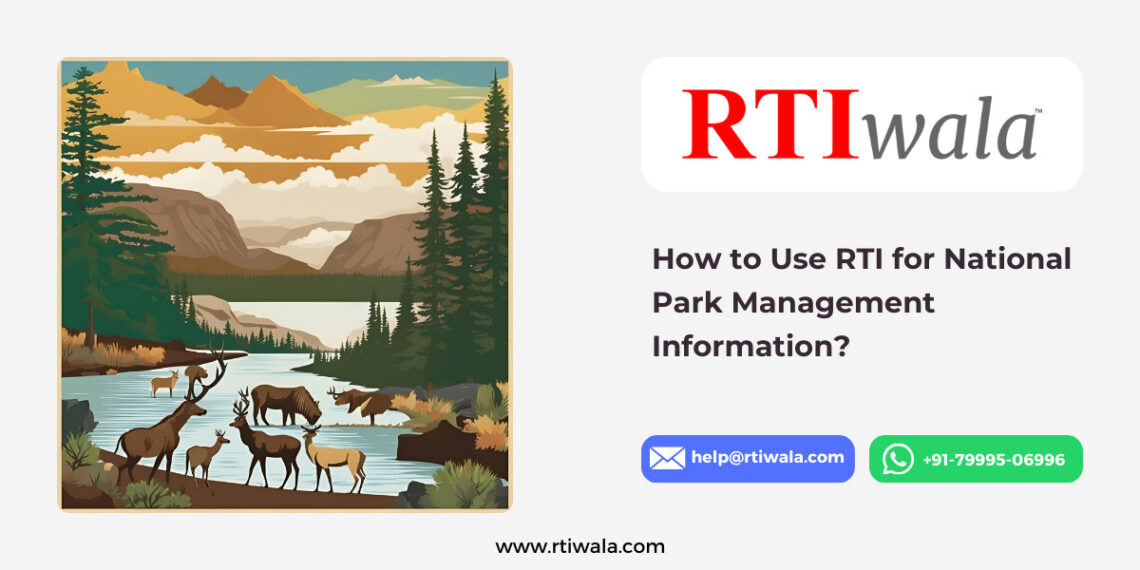Table of Contents
- Introduction
- Understanding RTI and Its Relevance to National Parks
- Why Accessing Information on National Parks is Important
- Steps to File an RTI for Information on National Parks
- Common Challenges in Filing RTI for National Parks
- How RTIwala Can Assist in Filing RTI for National Park Information
- Case Studies: Successful RTI Applications in National Parks
- FAQs
- Conclusion
Introduction
National parks are essential for preserving our natural heritage, protecting biodiversity, and maintaining ecological balance. Effective management of these parks is key to achieving these objectives. Citizens have the right to know how these parks are managed, how funds are allocated, and if conservation efforts are truly making an impact. The Right to Information (RTI) Act, with the support of RTIwala, empowers individuals to request this information and ensure accountability. In this article, you’ll learn how to use RTI to access important details about the management of national parks and hold authorities responsible for their stewardship.
Understanding RTI and Its Relevance to National Parks
The Right to Information (RTI) Act, 2005, is a powerful tool that allows citizens to request information from public authorities. When it comes to national parks, the RTI Act can be used to obtain details about:
- Conservation efforts: Learn about the measures being taken to protect endangered species and habitats.
- Funding and expenditure: Understand how funds allocated for park management and conservation are being utilized.
- Human-wildlife conflict management: Get information on the steps taken to mitigate conflicts between wildlife and nearby human populations.
- Tourism management: Discover how tourism is being managed to ensure that it does not negatively impact the environment.
By using RTI, citizens can ensure transparency and accountability in the management of national parks.
Why Accessing Information on National Parks is Important
National parks are public assets, and their management should be transparent. Accessing information on how these parks are managed helps ensure that:
- Conservation goals are met: Proper management is key to preserving biodiversity.
- Funds are used effectively: Public funds allocated for conservation must be spent wisely.
- Tourism is sustainable: Ensuring that tourism does not harm the park’s ecosystem is essential.
- Human rights are protected: Information about how human-wildlife conflicts are managed can protect local communities.
RTI empowers you to obtain this critical information and contribute to the better management of national parks.
Steps to File an RTI for Information on National Parks
Filing an RTI application is a straightforward process. Here’s how you can do it:
- Identify the Public Authority: Determine which government department or authority manages the national park in question. This could be the Forest Department or the Ministry of Environment, Forest and Climate Change.
- Draft Your Application: Write a clear and concise application. Mention that you are seeking information under the RTI Act and specify the details you need, such as budget allocations, conservation strategies, or details on tourism management.
- Submit Your Application: You can submit your RTI application online or in person. If you are filing online, use the official RTI portal. Make sure to include the prescribed fee with your application.
- Follow Up: After submission, track your application to ensure it is processed on time. If you don’t receive a response within the stipulated 30 days, you can file an appeal.
- Review the Information Received: Once you receive the information, analyze it to ensure it meets your request. If the information is incomplete or unclear, you can seek further clarification.
Common Challenges in Filing RTI for National Parks
While filing an RTI is relatively straightforward, you might encounter some challenges:
- Incomplete Information: Sometimes, the information provided may be incomplete or not directly related to your query.
- Delays in Response: Government departments may take longer than the stipulated 30 days to respond.
- Vague Responses: Authorities might provide vague or unclear information, which can be frustrating.
RTIwala can assist you in navigating these challenges, ensuring that your application is well-drafted, submitted correctly, and followed up promptly.
How RTIwala Can Assist in Filing RTI for National Park Information
RTIwala is dedicated to helping citizens effectively use the RTI Act. Here’s how RTIwala can assist you:
- Expert Guidance: RTIwala team of experts will help you draft your RTI application with precision, ensuring that all relevant details are included.
- Hassle-Free Filing: Whether you’re filing online or offline, RTIwala will handle the submission process for you, ensuring that everything is done correctly.
- Timely Follow-Up: RTIwala ensures that your application is tracked and followed up on, so you receive the information you requested without unnecessary delays.
- Overcoming Challenges: If you face any challenges, such as unclear or incomplete responses, RTIwala will guide you on how to address them effectively.
By choosing RTIwala, you can make the process of filing RTI applications smooth and efficient.
Case Studies: Successful RTI Applications in National Parks
Case Study 1:
A conservationist filed an RTI to uncover how funds were allocated for tiger conservation in a national park. The information revealed discrepancies, leading to a reallocation of resources to better protect the endangered species.
Case Study 2:
A local community used RTI to obtain information on the measures taken to prevent human-wildlife conflicts. The response led to improved safety measures and better coexistence between the community and wildlife.
These examples highlight the power of RTI in driving positive changes in the management of national parks.
FAQs
- Q1: What type of information can I request under RTI regarding national parks?
A: You can request information on conservation efforts, fund allocation, tourism management, human-wildlife conflict resolution, and more. - Q2: How long does it take to get a response to an RTI application?
A: By law, you should receive a response within 30 days of submitting your application. - Q3: What if my RTI application is rejected?
A: If your application is rejected, you can file an appeal with the appropriate authority. - Q4: Can I file an RTI application online?
A: Yes, you can file an RTI application online through the official RTI portal. - Q5: How can RTIwala help me in filing an RTI?
A: RTIwala can assist you in drafting your application, filing it, and following up to ensure you receive the information you need.
Conclusion
Filing an RTI for information on national parks is a powerful way to contribute to the preservation of our natural heritage. By accessing critical information on the management of these parks, you can help ensure that they are protected for future generations. If you need assistance in filing an RTI, RTIwala is here to help. With RTIwala expertise, the process becomes simple, efficient, and effective. Take the first step today and use your right to information to make a difference.





















































